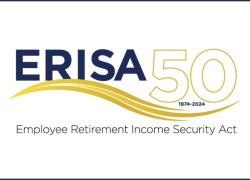When the Employee Retirement Income Security Act (ERISA) was enacted 50 years ago, it was intended to address mismanagement and abuse by those responsible for private pension plans. Over the years, ERISA has expanded to address new issues not only for retirement benefits, but also health and many other employee benefits provided by private job-based plans.
The Employee Benefits Security Administration’s (EBSA) mission to implement ERISA and protect these benefits has involved developing effective regulations and other guidance, assisting and educating workers, plan sponsors, fiduciaries and service providers, and vigorously enforcing the law. Over the years, as ERISA has changed, EBSA also has evolved to address the changes and new challenges. And our success would not be possible without our partners and stakeholders.
 From its origins as the Pension and Welfare Benefits Program through its elevation to a sub-cabinet position and into the 21st century, EBSA has worked with many members across the employee benefits community, including those involved in all aspects of administering job-based benefit plans, to accomplish the wide range of actions involved in our mission.
From its origins as the Pension and Welfare Benefits Program through its elevation to a sub-cabinet position and into the 21st century, EBSA has worked with many members across the employee benefits community, including those involved in all aspects of administering job-based benefit plans, to accomplish the wide range of actions involved in our mission.
Beginning with developing effective regulations, the input in the rulemaking process from voices across the employee benefits community has been critical to developing informed rules to implement the goals of ERISA. Through participation in comment periods to public hearings to implementation questions that help us develop further guidance to assist in compliance, the role of our stakeholders in this process in providing valuable information is a key to success.
Some of the initiatives EBSA and its partners have put into practice may not be high profile. However, all have been crucial in protecting benefits and helping participants. For example:
- The Abandoned Plan Program, begun in 2006, works with banks and other financial institutions to help workers access their retirement benefits. The program provides guidance for successfully terminating abandoned plans. It empowers financial institutions that hold the assets of abandoned plans to distribute benefits to participants and beneficiaries. Since 2006, working with the financial institutions that participate in the program, we’ve helped wind up 11,027 abandoned plans while processing 14,903 applications and distributing $614.5 million in retirement benefits from 95,505 individual accounts.
- The Terminated Vested Participant Project, launched in 2015 by our Philadelphia Regional Office and expanded nationally in 2017, together with the Philadelphia Regional Solicitor of Labor, developed enforcement procedures so pension benefit plans made sure that terminated participants knew what to expect from their job-based retirement plans and applied for benefits from those plans. From 2017 to 2023, the project resulted in over 57,000 former pension plan participants and beneficiaries receiving over $6.5 billion in benefits they may not have otherwise received.
- EBSA has worked closely with the American Institute of Certified Public Accountants and the Financial Accounting Standards Board to update guidance for practitioners, exchange knowledge and provide expert advice, resulting in improved quality of employee benefit plan audits.
- EBSA also worked with the Department of the Treasury and the Internal Revenue Service to make saving for retirement easier. Together we implemented automatic contribution and default investment provisions to help more workers start saving for retirement sooner.
Another critical component of our mission is outreach and education to create awareness and provide understanding of rights and responsibilities under ERISA. EBSA has developed focused education campaigns with partners sharing their expertise, helping us reach our target audiences, such as small business owners and plan service providers. This includes educating small business owners on their fiduciary responsibilities with respect to their retirement plans and providing compliance assistance on the many health benefit laws that are part of ERISA. We also have focused on increasing the understanding of rights and responsibilities related to mental health and substance use disorder benefits. We have worked extensively with members of the community to help get this information out, especially to underserved communities. The key to success has been bringing together the relevant expertise to provide comprehensive information in one place. This includes working with other federal agencies, such as the IRS, Health and Human Services and the Wage and Hour Division, state government, such as the state insurance commissioners, and industry experts such as the AICPA, Society for Human Resource Management, and many others whose partnerships we deeply value.
Our state and federal partners also help us enforce the law, resulting in a significant impact on the lives of workers and their families. In FY2023 alone, EBSA recovered $1.435 billion in direct payments to plans, participants and beneficiaries.
- In 2016, EBSA’s New York Regional Office, along with the New York State Attorney General’s Health Care Bureau, found that United Behavioral Health and its affiliate, United HealthCare, violated ERISA and the Mental Health Parity and Addiction Equity Act by reducing reimbursement rates for out-of-network mental health services, flagging participants undergoing mental health treatments for utilization review, resulting in many denials of payment, and failing to provide sufficient information to plans and participants. The health care companies paid $15.6 million and took corrective actions.
- In 2017, our Chicago, Atlanta and San Francisco regional offices opened an investigation into a multiple employer welfare arrangement (MEWA) that went by various names including AEU Holdings, LLC Employee Benefit Plan, and covered approximately 14,000 participants and beneficiaries working for more than 560 employers in 36 states. They found that the AEU plan was depositing employee and employer contributions in two offshore Bermuda accounts, leaving more than $26 million in unpaid medical claims. The resulting litigation secured more than $14 million towards paying outstanding claims and reimbursing employees’ out-of-pocket costs. EBSA took action to make sure that debt collection actions would not be initiated against participants with unpaid medical claims and issued its first-ever cease and desist order, which prevented the MEWA from being marketed to prospective employers or enrolling new employers.
- In July 2023, an EBSA investigation resulted in a settlement with fiduciaries of a retirement plan sponsored by DST Systems Inc. — including the investment management firm — where they agreed to pay more than $124.6 million to the retirement plan for alleged fiduciary breaches. The violations included failing to diversify the plan’s assets and failing to act prudently and loyally in managing these assets. For example, they invested the plan’s funds in the stock of a single pharmaceutical company which grew to more than 45% of the plan’s assets before the stock price fell dramatically.
Over the past 50 years, our work with members of the employee benefits community has been invaluable to achieving our shared goal. But we are only getting started – we know there is more to do. We look forward to continuing to work with you. Together we can make ERISA’s goals a reality.
Lisa M. Gomez is the assistant secretary for the Department of Labor’s Employee Benefits Security Administration.

 U.S. Department of Labor Blog
U.S. Department of Labor Blog







